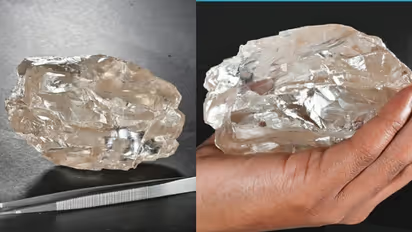Second-largest diamond found in Botswana! All you need to know about the 2,492-Karat stone

Synopsis
Botswana's authorities claimed it was the biggest diamond ever discovered in the southern African country and is a rough 2,492-Karat stone.
The second-largest diamond ever discovered which is a rough 2,492-Karat stone, was discovered in Botswana at a mine operated by Canadian company Lucara Diamond. It is the largest finding since the 3,106-carat Cullinan diamond, discovered in South Africa in 1905 and cut into nine distinct stones, several of which are housed in the British Crown Jewels. The diamond was discovered at the Karowe mine, approximately 500 kilometers (300 miles) north of Botswana's capital, Gaborone.
Second-largest diamond
Botswana's authorities claimed it was the biggest diamond ever discovered in the southern African country. The previous largest discovery in Botswana at the same mine in 2019 was a 1,758-carat stone. Botswana is one of the world's largest diamond producers, accounting for approximately 20% of total production. Since 2017, it has been locating and conserving high-value diamonds, preventing them from breaking during ore-crushing procedures. The corporation did not specify the stone's gem quality or worth.
Also read: Saif Ali Khan is back in Race 4! THIS actor is likely to join the cast, details here
However, the UK-based Financial Times newspaper said that persons close to Lucara, who was not named, thought that the stone was worth up to $40 million (£30.6 million). The 1,758-carat stone discovered in 2019 was purchased by the French luxury house Louis Vuitton for an unknown fee. A 1,109-carat diamond discovered at the same mine in 2016 was purchased for $53 million by London jeweller Laurence Graff, chairman of Graff Diamonds, in 2017.
About Botswana
Botswana, located in Southern Africa, is a landlocked country renowned for its political stability, economic growth, and rich natural resources. The country is characterized by its diverse landscapes, including the Kalahari Desert, which covers a significant portion of its territory, and the Okavango Delta, one of the world's largest inland deltas and a UNESCO World Heritage site. The climate is generally arid or semi-arid, with hot summers and mild winters.
Explore the latest Lifestyle News covering fashion, wellness, travel, Food and Recipes, and more. Stay updated with trending Health News, fitness tips, and expert insights to inspire your daily living. Discover personalized lifestyle trends that keep you stylish and informed. Download the Asianet News Official App from the Android Play Store and iPhone App Store for everything that adds value to your everyday life.